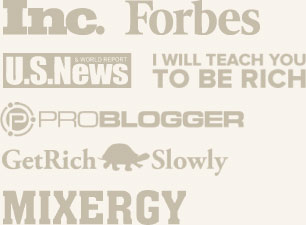Beat the Big Corporations by Delivering the Best Customer Experience

Is emulating the “big boys” really a key to success?One of the most common mistakes I see when people first start a business — and I see this one clearly because I did it myself — is to want to make themselves look more “corporate.”
Sometimes, corporate is good — it’s professional. For instance, I don’t recommend using those tear-out business cards with dotted-line edges. Can we put those back in the 1980s where they came from?
The mistake I most often see is not in business cards, though — it’s in the message of your business. There is a pervasive belief that the more “corporate” your website and emails look, the better.
I completely disagree, and here’s why.
Why You Shouldn’t Emulate Large Corporations
Many of you, as business owners, look to large corporations’ websites and marketing materials to see what you should do. For instance, if you’re starting a restaurant, you may wish to emulate the Cheesecake Factory website.
There’s nothing inherently wrong with this, except that you do yourself a disservice by trying to clone these websites. By making your website a clone a big company in your industry, you miss out on the largest marketing opportunity for your small business: you.
I have a new marketing message for you: Be personal.
Here are seven ways you can beat the big corporations by refusing to play their “corporate” game:
- Have an About page that talks about you, not just your company. One of the first pages I click on on any website is the “About Us” page. I want to put a face to the name. Why are you doing what you’re doing?
If your blog doesn’t have an About page, I won’t subscribe. It leaves me feeling “empty” — even if the content is fantastic, I have nothing to anchor that to.
Also, when I go to your About page, I don’t want to read your resume! Please don’t barrage me with bullet points. Just write an honest, factual description of who you are and why you started your business or blog — and put in your picture!
- Use personality in your emails. When you send an email to your customers, as far as I’m concerned, the more personal you get (in terms of how you view your business), the better. When I say “personal”, I’m not talking about adding a little token that inserts the customer’s first name from your database. I’m saying — tell us your thoughts, your actions, and your successes. If you’ve had a failure, explain why and what you’re doing to rectify it.
- Tell your customers you take failures personally. If you own a business, you should be taking failure personally. You will create a bond with your customers by emailing them all or calling them — even if they weren’t personally affected — and sharing what your failure was and how you’re taking action so that it won’t happen again. Then, as soon as you finish telling your customers, take that action — even if it means making a tough choice, like firing an employee.
- Stop being so afraid to call your customers. It’s often easier to throw together a pre-generated email to your customers than it is to pick up the phone. If you really want to make an impression on your customers, give them a call.
- Send hand-written thank-you cards. If you want to have your assistant mail these out, there’s nothing wrong with that. But sign every one individually. If a customer, a vendor, or a supplier has really gone out of their way to help you, let them know with a hand-written, mailed thank-you card. Thank-you cards are a lost art, and they’re something that customers appreciate.
- Acknowledge that you can learn from your customers. When a customer offers you advice, listen! Write it down. Think about it. I often received advice from our customers — from loony ideas that would never work to good ideas that we implemented to become more successful. No matter the idea, however, I listened to it. I replied with, “That’s good advice. Thank you. I’ll see if we can do something like that.”
- Enjoy the fact that your business is small. Big businesses have a host of their own problems. Don’t be afraid to be small. Being small means you have a better opportunity to deliver the best customer experience. It means your customers can pick up the phone and chat with the CEO (that’s you!) if they need help. It means you are personally committed to your customers’ success. Tell your customers this!
Why Should You Be Personal?
In every single business, you will win customers by letting them know that there’s a person out there on the other end of the transaction. What customers want to know most is that they’re heard — that someone out there is listening to them and taking them seriously.
Like I said, I learned this the hard way. I used to send out boring corporate emails with no real information in them. They would have titles like “Simpli Hosting Customer Newsletter.” Yawn!
Once I started to put some personality into my business, it started to take off. I ignored the naysayers who said I was putting too much of myself into my business and that 1) it would scare away large customers and 2) I would never be able to sell the business.
Those opinions are based in fear…that if you truly connect with a customer, your business will forever be small. It doesn’t work that way.
It really comes down to how you define success. Some would imagine business success as having a huge company with tons of employees and a giant office. I would argue that the real successes are the little ones that most people don’t know about: the happy customers who thank you, and the lives you know you have made better with your business. And yes — to stop the naysayers — you can make a multi-million dollar business with a personality!
With that said, go out there and be personal. Send hand-written cards and put your grinning face on your website. Make your customers excited to give you their money. That’s success.
Recommended Reading:
- Sparkplug CEO is running a contest where you can enter to win a new printer. One of the ways to enter is writing a blog post sharing the best marketing advice you received when you were new to starting a business. This blog post is my entry into the contest. Thank you, Sparkplugging, for this opportunity!
- How to Win Friends and Influence People. If you haven’t read this yet, buy it today. Includes a gripping story of “the best car salesman in the country” (something we can all learn from — he didn’t get customers in the way you’d expect!)
- How I Turned My Mediocre Website Into A Million-Dollar Business. Hiring fancy website designers isn’t the key to success, either.
- Are Your Business Cards Still Stuck in the 1990’s? Business cards are a good way to get personal, too. I show off my unique business cards in this post.



